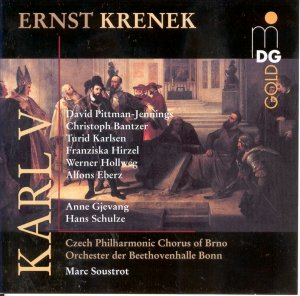Be clear from the outset. This is an austere twelve-tone
opera; earnest in the manner of Pfitzner's Palestrina but determined
to avoid the 'easy melody'. It mixes singing with speech although singing
predominates. There are no conventional arias. Krenek's immersion in
the atonal stream can be traced to his years in Vienna. This opera marked
the re-setting of his tonal palette to dodecaphony.
Krenek wrote that he had made this opera explicitly
anti-Nazi, pro-Austrian and Catholic. The nationalism that destroys
King Karl is an analogue of the Nazi nationalism destroying Europe under
Hitler. Krenek's ambitions for the piece were probably unrealistic given
that he cherished for it an artistic assault in favour of the Austrian
identity and renaissance. Dabbling in politics in this way had the predictable
result: the planned 1934 premiere in Vienna was cancelled. Krenek departed
for the USA. Karl V was nevertheless premiered at the Deutsches
Theater, Prague on 15 June 1938. The revised version was produced at
Dusseldorf on 11 May 1958.
Krenek was Viennese by birth. He died in Palm Springs,
California. He became a US citizen in 1945 having been head of music
at Hamline University, St Paul, Minnesota since 1939. In 1947 he moved
to Los Angeles. His productivity in no way dimmed and he produced a
large number of works in all genres. From Karl V onwards his
preferred mode of expression was dodecaphonic. Before that he had written
works influenced by the impressionism of his teacher Schrecker and during
the mid-1920s he experimented with jazz, fox-trots and blues. The classic
work of this intermediate era is the opera Jonny Spielt Auf! which
includes a rattle, sounds from a radio, a locomotive whistle and a car
horn. There is also a Schubertian-lyric song cycle from the late 1920s.
The opera is in the format of a dialogue between Karl
and his confessor. Incidents providing dramatic material mingle with
dialogue and commentary. Karl is pictured on his deathbed. He is called
upon by the Voice of God to account for his decisions. In Part II Karl
is racked with doubts and his judgement is left to God rather than Man.
Karl's vision for Austria is painted. There has been at least one earlier
LP recording of this opera in 1980 on the Amadeo label. This included
Sena Jurinac, Peter Schreier, Theo Adam with the ORF SO conducted by
Gerd Albrecht.
The opera proceeds scene by scene: ten in Part I and
nine in Part II.
There are occasional flashes of dance rhythms as in
the Francis interlude in the 4th section of Part I. This is the most
accessible section. Only four years previously Krenek had written the
Schubertian song-cycle Reisebuch aus den Österreichischen Alpen
(great title!) and just occasionally one catches a hint of what
that might have sounded like. Viennese moments can relieve the dark
clouds as does the distressed Hispanic flavour in scene 5 of Part I.
The writing also picks up on some weighty Beethovenian choral singing.
More commonly however the voices are from Lulu or Wozzeck
- perhaps crossed with Fidelio. Part II makes heavier use of
the spoken word. Grim merriment occasionally lightens the scene but
overall this is pretty dour stuff though lit by restless and life-like
acting.
This production is superbly documented with full libretto
and translations. The notes are in one booklet; the libretto in another.
Recommended for those with case-hardened sinews or
those fascinated by the spoor left by the ones who refused to conform.
As a historic document this holds the attention. As a work of art ...
I have my doubts.
Rob Barnett


